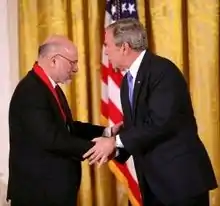National Association of Scholars
The National Association of Scholars (NAS) is an American 501(c)(3) non-profit politically conservative education advocacy organization.[2][3] It advocates against multiculturalism, diversity policies, and against courses focused on race and gender issues.[4][5]
 | |
| Predecessor | Campus Coalition for Democracy |
|---|---|
| Founded | 1987 |
| Founder | Stephen Balch |
| Location |
|
Membership | Approx. 2,600[lower-alpha 1] |
President | Peter Wyatt Wood |
Acting Chairman | Keith Whitaker |
Revenue (2016) | $1,167,745[1] |
| Expenses (2016) | $1,095,412[1] |
Staff | 10 |
| Website | nas |
History and organization

Originally called the Campus Coalition for Democracy, the National Association of Scholars was founded in 1987 by Herbert London and Stephen Balch[6][7] with the goal of preserving the "Western intellectual heritage".[2] As of 2021, Peter Wyatt Wood is the president.[8] The advisory board of the NAS has included several notable conservatives, such as Jeane Kirkpatrick, a former United States Ambassador to the United Nations and adviser to Ronald Reagan. Chester Finn helped to form the conservative movement's education policies.[5] According to the association, it has affiliates in 46 U.S. states, as well as in Guam and Canada.[9]
NAS has received funding from politically conservative foundations, including the Sarah Scaife Foundation, the John M. Olin Foundation, the Bradley Foundation, the Castle Rock Foundation, the Smith Richardson Foundation, and the Arthur N. Rupe Foundation.[10][11][12]
Positions and activities
The NAS engaged the American Association of University Professors over its diversity standard, and complained to the secretary of the U.S. Department of Education, Lamar Alexander, who ruled that the Middle States Association of Colleges and Schools must eliminate it. Academics studying the group have described NAS as "conservative",[13] a "group of reactionary scholars" and "a leading vehicle for the conservative attack on multiculturalism and political correctness".[14] Jacob Weisberg stated in 1991 that NAS is "prone to conflating its admirable ideals with far less compelling political prejudices."[15]
Chapters of the NAS have been involved in a number of campus controversies related to affirmative action and multicultural studies programs. According to People for the American Way, NAS faculty at the University of Texas, Austin blocked the inclusion of civil rights readings in an English course; the readings had been proposed to address concerns about racial and sexual harassment on campus.[11] In 1990, the NAS placed an advertisement in the Daily Texan (the University of Texas student newspaper), calling for the rejection of a proposed multiculturalism curriculum at the University of Texas.[16] Simultaneously, the NAS encouraged a successful campaign to defund the university's Chicano newspaper.[11] Time magazine in 1991 called NAS the "faculty opposition to the excesses of multiculturalism" and to "courses about race and gender issues."[4]
In 1990, a Duke University chapter of the NAS was formed by political science professor James David Barber. The new chapter provoked "a sometimes bitter debate" about the NAS stances on race and gender, and on whether academic freedom should extend to what NAS critics viewed as intolerance. Stanley Fish, chairman of the English department at Duke, wrote that NAS "is widely known to be racist, sexist and homophobic." In an interview with the Durham Morning Herald, Barber called Fish "an embarrassment to this university for his gross insult to this organization." In response to the NAS chapter formation, a larger group of faculty formed "Duke Faculty for Academic Tolerance".[17]
Also in 1990, the Harvard University community debated the presence of the NAS. Writing in the Harvard Crimson, Martin L. Kilson Jr. acknowledged some "overzealous behavior by supporters of ethnic studies and women studies" but argued that the NAS was an "overkill neoconservative response." In Kilson's view, NAS had succumbed to "anxiety and maybe phobia" of multiculturalism. He asks, "why shouldn't persons on our campuses go to great lengths to avoid the tag 'racist'"? Or the tags 'homophobic', 'sexist', 'anti-Asian', etc.?"[18][4]
In 2001, it was reported that the Colorado Commission on Higher Education had paid the National Association of Scholars $25,000 to generate a report on several Colorado universities with education programs. The NAS report criticized diversity curricula and recommended that the University of Colorado's education program be suspended and new admissions to other programs be halted.[5] University of Colorado, Boulder dean William Stanley resigned in protest of what he called "teacher-bashing" by the NAS,[3] while regent Bob Sievers deplored "anti-teaching, anti-C.U./Boulder, anti-women and anti-minority bias." Questions were also raised regarding why money was paid to a "right-wing" organization like the NAS[3] rather than to a group "with credentials in teacher education."[5]
In September 2008, The New York Times described the NAS as among the politically conservative organizations intensively and successfully lobbying for federal funding for programs which emphasize "traditional American history, free institutions or Western civilization". The Times reported that NAS and allied organizations sought to advance conservative causes by attaching conditions to university donations.[2]
In 2011 NAS launched its Center for the Study of the Curriculum to "document and to analyze important changes" to college curricula and "to propose improvements."[19] The center conducts yearly reviews of colleges and universities' common reading programs. The annual Beach Books report identifies the colleges that have these programs, the books they assign, and patterns in the assignments. The 2012–13 report found that 97 percent of colleges and universities chose books published in or after 1990. The most popular book assigned was The Immortal Life of Henrietta Lacks by Rebecca Skloot.
In January 2013 the Center for the Study of the Curriculum, along with NAS's affiliate the Texas Association of Scholars, released a report, Recasting History, on U.S. history courses taught in the Fall 2010 semester at the University of Texas and Texas A&M University, which criticized the weight that the courses gave to race, class, or gender.[20][21] After the report's release, Jeremi Suri, the Mack Brown Distinguished Professor for Global Leadership, History, and Public Policy at UT-Austin, called the report "misleading, and frankly dumb."[22] Writing in The Alcalde, the official alumni magazine, Suri defended the University of Texas's course offerings, saying, "What we are teaching at UT, in almost all of our history and related courses, is a plural history of how many different people and parts of America relate to one another. What we are teaching is the beauty, the color, the promise, and also the challenge of contemporary America."[22]
In April 2013, NAS released What Does Bowdoin Teach? How a Contemporary Liberal Arts College Shapes Students, which criticized Bowdoin College in Brunswick, Maine for employing too few conservatives, as well as for its endorsements multiculturalism and sustainability and for its anti-hazing rules.[23][24] Writing in the Bowdoin Sun (the college's official newspaper) Bowdoin president Barry Mills called the report "mean-spirited and personal."[25][23]
Academic Questions
| Discipline | Higher education |
|---|---|
| Language | English |
| Edited by | Peter Wood |
| Publication details | |
| History | 1987–present |
| Publisher | Springer Science+Business Media on behalf of the National Association of Scholars |
| Frequency | Quarterly |
| Standard abbreviations | |
| ISO 4 | Acad. Quest. |
| Indexing | |
| CODEN | ACQUEO |
| ISSN | 0895-4852 (print) 1936-4709 (web) |
| LCCN | 88649846 |
| OCLC no. | 260176958 |
| Links | |
The NAS's quarterly journal, Academic Questions, publishes articles and interviews on higher education, with a focus on examining issues that arise from the interplay among politics, ideology, scholarship, and teaching in higher education.[26] Academic Questions describes itself as "a journal dedicated to strengthening the integrity of scholarship and teaching."[27]
Academic Questions has included articles by Jacques Barzun, Eugene Genovese, Thomas Sowell, and Terry Eagleton, and interviews with Tom Wolfe, Julius Lester, Napoleon Chagnon, and Joseph Morrison Skelly. Richard Arum, Jill Biden, Andrew Delbanco, Joseph Epstein, Victor Davis Hanson, Wilfred M. McClay, Charles Murray, and Ibn Warraq were among those who contributed to Academic Questions, "One Hundred Great Ideas for Higher Education", a symposium in the journal's 100th issue published in 2012.
Notes
- Including both active and associate members.
References
- "National Association of Scholars" (PDF). Foundation Center. Retrieved 12 November 2018.
- Cohen, Patricia (September 21, 2008). "Conservatives Try New Tack on Campuses". The New York Times. Retrieved September 22, 2008.
- Curtin, Dave (8 April 2001). "CU dean resigns, rips state". denverpost.com. Retrieved 12 November 2018.
- Elson, John (1 April 2001). "Academics in Opposition". Time. Retrieved 12 November 2018.
- Campbell, Bob (24 May 2001). "State Education Commission Coming Under Fire". Colorado Springs Independent. Retrieved 12 November 2018.
- "Overview". National Association of Scholars. Retrieved 12 November 2018.
- Wilson, John (1996). The Myth of Political Correctness. Duke University. ISBN 978-0-8223-1713-5.
- "Staff & Board". National Association of Scholars. Retrieved 12 November 2018.
- "Affiliates". National Association of Scholars. Retrieved 12 November 2018.
- Flint, Anthony (12 April 1994), "Anti-PC activists trade war stories at Harvard", Boston Globe, p. 22.
- "Buying a Movement: Conservative University Programs and Academic Associations" (PDF). People for the American Way. Retrieved May 7, 2010.
- "Sustainability Report". National Association of Scholars. March 2015. p. 10.
- Goldberg, David Theo (1994). Multiculturalism : a critical reader. Cambridge, MA: Blackwell. ISBN 978-0-63118911-4. Retrieved 12 November 2018.
- Feldstein, Richard (1997). Political correctness : a response from the cultural Left. Minneapolis University of Minnesota Press. ISBN 978-0-81662475-1. Retrieved 12 November 2018.
- Weisberg, Jacob. "NAS – Who are These Guys Anyway?" Lingua Franca Apr. 1991: 34–39
- Getman, Julius. In the Company of Scholars: the Struggle for the Soul of Higher Education. Austin: University of Texas P, 1992.
- "Duke Scholars' Group, Accused of Bias, Divides Faculty". The New York Times. October 21, 1990. Retrieved June 4, 2008.
- Kilson Jr., Martin L. (11 December 1990). "Keep the National Association of Scholars Away From Harvard". The Harvard Crimson. Archived from the original on 5 April 2014. Retrieved 12 November 2018.
- "Center for the Study of the Curriculum". NAS.
- "Recasting History". NAS.
- "An Undisciplined Report on the Teaching of History". The Chronicle of Higher Education. 28 January 2013. Retrieved 2023-05-09.
- Suri, Jeremi (2013-01-10). "What Kind of History Should We Teach?". The Alcalde.
- Russell Globe, Jenna. "Bowdoin president defends school after report - The Boston Globe". BostonGlobe.com. Retrieved 2023-05-09.
- "The Bowdoin Project". NAS.
- Mills, Barry. "Setting the Record Straight". Bowdoin Daily Sun.
- "About Us". National Association of Scholars. Retrieved July 6, 2021.
- "Academic Questions". Link. Springer.